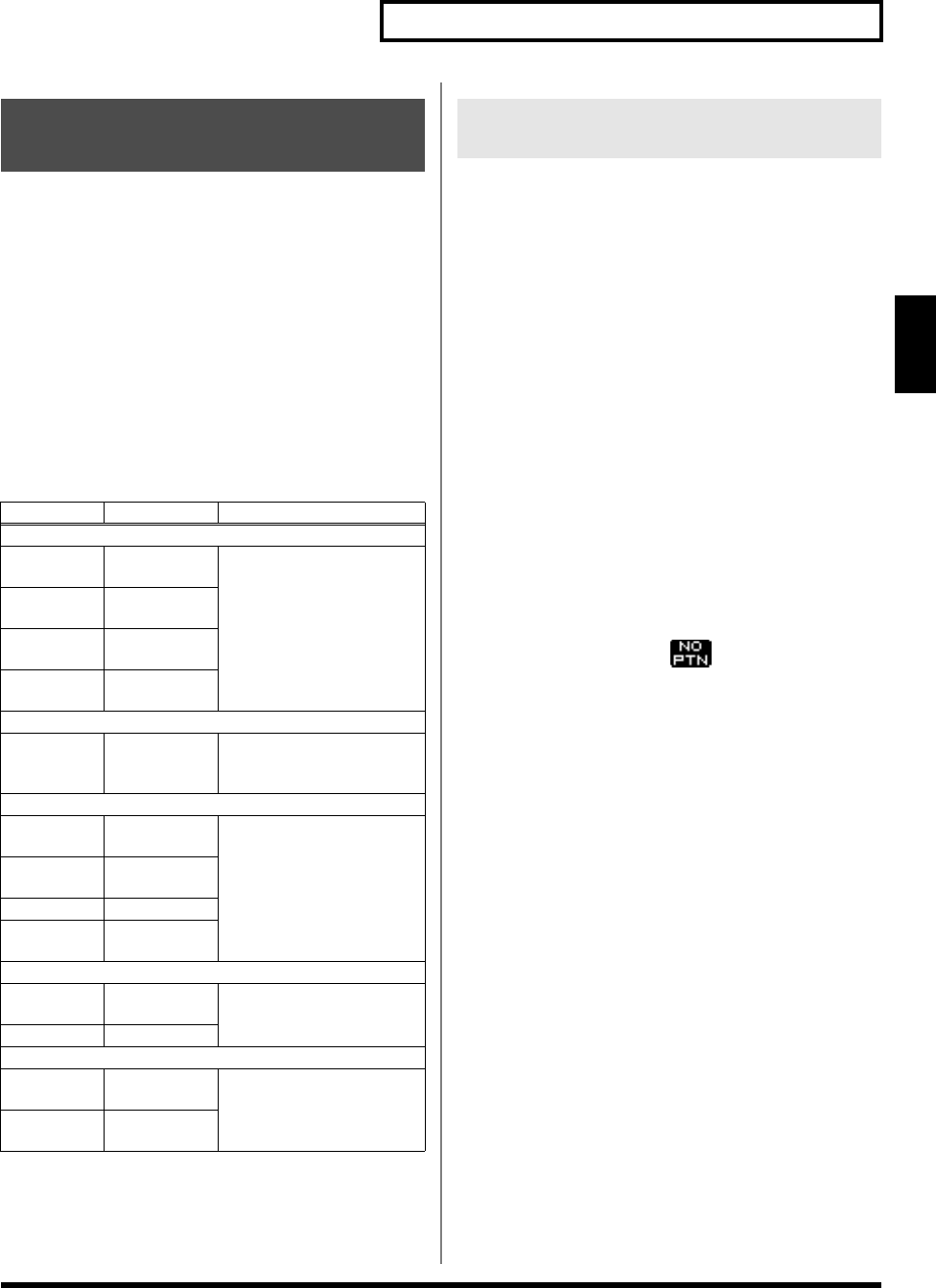
37
Chapter 2. Drum Instrument Settings [INST]
Chapter 2
[INST]
1.
Press [INST] - [F3 (CONTROL)].
2.
Strike a pad.
The settings screen for the struck pad appears.
You can select by using [SHIFT] and [CURSOR (left/
right)].
3.
Press [F1]–[F5] and [CURSOR (up/down)] to
select the parameter.
4.
Use [+/-] or [VALUE] to adjust settings.
5.
When finished, press [EXIT] to return to the
“INST” screen.
This function starts playback of a pattern when a pad is struck.
This function provides a very convenient way to use patterns
during a live performance.
If different patterns have been assigned to two or more pads,
striking another pad while a pattern is playing back will cause
pattern playback to switch to the newly selected pattern.
* When playing back patterns with recorded drum kit
performances or demo songs, the patterns assigned to the pads
are not played back, even if the Pad Pattern function is enabled
for the selected drum kit.
* Performances using the Pad Pattern function cannot be
recorded to sequencers.
PadPtn Master Sw:
ALL OFF, ON
You can switch use of the Pad Pattern function on and off
in each individual drum kit.
ALL OFF:
The Pad Pattern function is not used.
ON:
The Pad Pattern function is used.
PadPtn:
OFF, P 1–150, U 151–250
Selects the played back pattern when the pad is struck.
* If all pads are set to “OFF,” icon appears.
PadPtn Velocity:
OFF, ON
OFF:
The pattern plays back at the velocity set for the pattern,
regardless of the strength with which the pad is struck.
ON:
The pattern plays back with the velocity changing in
response to the strength with which the pad is struck.
Tap Ptn Mute Grp:
OFF, 1–8
In Tap playback (p. 61), if one sound (pattern) is set to
play before the previous sound (pattern) has finished
playing, this setting allows you to either have the
previous sound stop and the subsequent sound start
playing or have the two sounds layered.
Patterns set to the same number:
The previous sound stops while in progress, and the
subsequent sound (pattern) starts playing.
Patterns set to the different numbers:
The previous sound continues to play to the end, while
the subsequent sound (pattern) is superimposed on it.
Regarding Sounds Played with Pad
Pattern
With Pad Pattern, performance of the pattern starts only when
the pad is struck with sufficient force.
If the pad is struck weakly, only the instrument sound
assigned to the pad is played; the pattern is not played back.
Using Pads/Pedal as
Controllers [F4 (CONTROL)]
Parameter Value Description
[F1 (PATTERN)]
PadPtn
Master Sw
ALL OFF,
ON
Refer to
Playing a Pattern
by Hitting a Pad (Pad Pat-
tern) [F1 (PATTERN)]
(p.
37).
PadPtn OFF, P 1–150,
U 151–250
PadPtn
Velocity
OFF, ON
Tap Ptn
Mute Grp
OFF, 1–8
[F2 (PDLBEND)]
Pedal Bend
Range
-24–0– +24 Refer to
Changing the
Pitch with the Hi-Hat Ped-
al [F2 (PDLBEND)]
(p. 38).
[F3 (MIDI)]
Tx Channel
CH1–CH16,
GLOBAL
Refer to
MIDI Settings for
Each Pad [F3 (MIDI)]
(p.
38).
Note No. 0 (C -)–127
(G9), OFF
Gate Time 0.1–8.0 (s)
Position
Ctrl Sw
OFF, ON
[F4 (HH MIDI)]
Note No.
0 (C -)–127
(G9), OFF
Refer to
MIDI Note Num-
bers transmitted by Hi-
Hat [F4 (HH MIDI)]
(p. 38).
Gate 0.1–8.0 (s)
[F5 (BR MIDI)]
Brush Note
No.
0 (C -)–127
(G9), OFF
Refer to
MIDI Note Num-
ber transmitted by Brush
Sweep/Cross Stick [F5
(BR MIDI)]
(p. 38).
XStick Note
No.
0 (C -)–127
(G9), OFF
Playing a Pattern by Hitting a Pad
(Pad Pattern) [F1 (PATTERN)]
TD-12_e.book 37 ページ 2005年5月31日 火曜日 午後1時32分


















